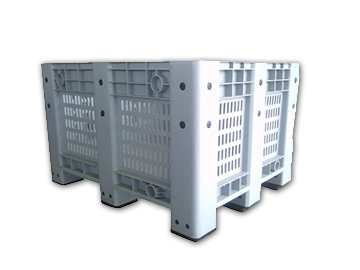The Duty of Bulk Plastic Containers in Effective Recycling Practices and Sustainability
Mass plastic containers are indispensable to modern recycling initiatives. Their design boosts the performance of product collection and transport, adding to sustainability objectives. These containers not only optimize area but also help in keeping an eye on contamination levels. However, their execution is not without challenges. Understanding the complete extent of their impact exposes a complicated connection in between logistics and environmental responsibility that necessitates additional exploration.
Recognizing Mass Plastic Containers
Bulk plastic containers offer as a vital part in different sectors, helping with the storage and transportation of items. These containers are typically made from durable products such as high-density polyethylene (HDPE) or polypropylene, which supply resilience and resistance to ecological variables. Their layout commonly consists of features like stackability and modularity, permitting effective usage of area throughout both storage space and transit.
Industries such as farming, food handling, and making often use mass plastic containers due to their lightweight nature and convenience of handling. The containers can be found in numerous sizes and arrangements, satisfying the particular requirements of different products. Their versatility prolongs past plain capability; they can additionally be customized with lids, deals with, and labeling alternatives to enhance functionality - Bulk Plastic Containers. Because of this, bulk plastic containers play a critical role in maximizing logistics and supply chain operations throughout numerous industries, thus contributing to total efficiency and cost-effectiveness
Benefits of Using Mass Plastic Containers in Recycling
The usage of bulk plastic containers substantially boosts the performance of the process when companies focus on recycling efforts. These containers are developed to maximize space, permitting for the storage and transportation of bigger quantities of recyclable products. This causes less trips to recycling centers, therefore reducing gas consumption and associated emissions.
Additionally, mass plastic containers are long lasting and resistant to different ecological variables, making certain that materials continue to be shielded during handling and transit. Their light-weight style even more contributes to lower transportation prices.
The harmony of these containers promotes much better sorting and handling of recyclable materials, which can enhance overall recycling prices. Organizations that adopt bulk plastic containers also show a commitment to sustainability, positively affecting their brand image. Inevitably, these advantages not only simplify reusing practices however additionally add to more comprehensive environmental objectives
Just How Mass Plastic Containers Facilitate Product Collection
Reliable product collection is considerably improved by the use mass plastic containers, as they provide a efficient and structured service for collecting recyclable things. These containers are designed to accommodate huge volumes of materials, which simplifies the sorting and storage procedure. Their stackable layout makes best use of room utilization, making it less complicated for centers to arrange recyclables without mess.
Additionally, bulk plastic containers are resilient and weather-resistant, enabling outdoor positioning without degradation. This resilience guarantees that products stay protected until they are accumulated for handling.

The uniformity in size and shape of these containers promotes standardization across collection factors, making it possible for much better monitoring of recyclable quantities. Their transparent nature allows for easy exposure of materials, aiding in the tracking of contamination levels and guaranteeing that just ideal materials are collected. Overall, mass plastic containers play a crucial role in streamlining the material collection procedure, consequently promoting effective reusing practices.
Transport Effectiveness and Environmental Impact
Transport performance plays an important function in the reusing process, particularly through the optimization of lots capacity in bulk plastic containers. By taking full advantage of the quantity of product moved, firms can significantly decrease the number of trips called for, thus decreasing their carbon footprint. This method not only improves operational efficiency yet likewise adds to extra lasting ecological methods.

Optimizing Lots Ability
Although maximizing load ability is often overlooked, it plays a crucial role in boosting transportation efficiency and decreasing ecological effect in reusing techniques. By making best use of the volume that mass plastic containers can hold, reusing procedures can decrease the variety of journeys needed for transportation. This not just lowers gas intake yet also lowers the damage on cars. Effective load monitoring permits centers to use space successfully, making sure that each transport cycle is as effective as feasible. In addition, well-optimized loads can lead to far better negotiations with logistics providers, potentially decreasing total costs. Eventually, improving lots ability adds to a more lasting reusing system by promoting reliable resource use and decreasing waste produced throughout transportation.
Lowering Carbon Impact
As reusing procedures undertaking to minimize their environmental impact, lowering the carbon impact associated with transport arises as an important objective. Mass plastic containers play a crucial duty in attaining this objective by enhancing tons performance and enhancing logistics. Their lightweight yet resilient style permits optimum freight room usage, minimizing the variety of journeys called for to move products. By settling shipments, recycling centers can reduce gas consumption and greenhouse gas emissions. Additionally, tactically finding recycling centers decreases transport ranges, in addition lowering carbon results. Furthermore, utilizing fuel-efficient vehicles and alternate power sources enhances total sustainability. By incorporating these techniques, the reusing sector can appreciably reduce its carbon footprint, contributing to a more sustainable future.
Challenges in using Bulk Plastic Containers

Contamination Concerns
Contamination issues represent a substantial obstacle in the reliable use of mass plastic containers within recycling techniques. These containers frequently gather deposits from previous contents, causing mixed materials that can impede the recycling process. Impurities such as food waste, chemicals, or non-recyclable materials can jeopardize the honesty of the entire batch, causing enhanced disposal prices and decreased reusing prices. Furthermore, improper cleaning or sorting can worsen these issues, making it difficult for recycling facilities to process materials effectively. The existence of impurities not just impacts the quality of recycled items yet likewise threatens the overall sustainability initiatives intended at minimizing plastic waste. Resolving these contamination challenges is important for improving the efficacy of bulk plastic container recycling.
Recycling Infrastructure Limitations
Ineffectiveness in recycling framework poses considerable obstacles for the efficient monitoring of bulk plastic containers. Lots of recycling facilities lack the capacity to process big volumes of these containers efficiently, resulting in boosted hold-ups and expenses. Furthermore, insufficient arranging technologies commonly lead to contamination, as bulk containers might be combined with other materials, complicating the recycling procedure. Limited transportation options likewise hinder the movement of bulk plastic containers to ideal recycling facilities, leading to enhanced landfill waste. Furthermore, an absence of standard procedures for mass container recycling creates confusion among services and consumers, further complicating initiatives to advertise sustainability. Resolving these facilities limitations is vital to improve recycling techniques and take full advantage of the potential of mass plastic containers in a circular economic situation.
Best Practices for Implementing Bulk Plastic Containers
They ought to prioritize a strategic technique that boosts performance and reduces contamination dangers when companies think about executing bulk plastic containers in their reusing practices. First, picking the appropriate container dimension and type is vital to accommodate the volume of materials being processed. Organizations needs to likewise develop clear labeling and signs to direct users on correct disposal techniques, lessening confusion and errors. Routine training sessions for team can better enhance these techniques, ensuring every person recognizes their functions in keeping reusing stability.
Furthermore, organizations need to implement a routine maintenance routine to examine and tidy containers, preventing the buildup of pollutants. Partnering with regional reusing facilities can also simplify the collection process, guaranteeing that products are effectively refined. Companies ought to monitor and evaluate their recycling metrics, utilizing this data to fine-tune methods over time and advertise continual renovation in their sustainability efforts.
The Future of Mass Plastic Containers in Sustainable Practices
As companies significantly focus on sustainability, the function of bulk plastic containers in recycling practices is established to develop significantly. Developments in materials science are resulting in the growth of naturally degradable and recyclable alternatives, boosting the environmental advantages of mass plastic containers. On top of that, the application of closed-loop systems will certainly enable less complicated collection and repurposing of these containers, minimizing waste and resource usage.
Technological advancements, such as clever tracking systems, will allow business to monitor the lifecycle of mass containers, enhancing efficiency in recycling processes. As customer need for sustainable methods grows, companies will likely adopt bulk plastic containers developed for reuse and lasting worth. In addition, cooperation between markets and governments will cultivate the facility of standardized reusing methods, ensuring that mass containers are properly incorporated into broader sustainability efforts. Overall, the future of mass plastic this page containers appears promising, with substantial potential for contributing to a circular economy.
Frequently Asked Questions
Exactly How Are Mass Plastic Containers Made and What Products Are Utilized?
Mass plastic containers are typically made from high-density polyethylene (HDPE) or polypropylene (PP) These materials are processed with shot molding or impact molding strategies, leading to long lasting, lightweight containers appropriate for various storage and transportation requirements.
Can Mass Plastic Containers Be Recycled Numerous Times Before Recycling?
Yes, bulk plastic containers can be reused numerous times prior to reusing. Their sturdiness and style enable for repeated use in different applications, promoting sustainability and view website resource effectiveness while reducing the need for brand-new containers.

What Certifications Exist for Mass Plastic Containers in Recycling?
Different certifications for bulk plastic containers include the Recycling Collaboration's certification, the Cradle to Cradle Licensed ™ requirement, and the Sustainable Packaging Union's standards, ensuring containers satisfy certain environmental and recyclability standards for reliable recycling.
How Do Mass Plastic Containers Compare to Various Other Recycling Storage Options?
Bulk plastic containers use better longevity and capacity compared to other recycling storage options, minimizing the risk of contamination and facilitating effective transportation. Their style sustains much better company, improving general effectiveness in recycling procedures.
What Is the Lifespan of a Bulk Plastic Container in Recycling Processes?
The lifespan of a mass plastic container in recycling processes normally varies from 5 to one decade, depending upon use, worldly high quality, and environmental conditions, permitting for multiple cycles of use prior to ultimate disposal or recycling.
When companies focus on reusing efforts, the use of bulk plastic containers greatly enhances the performance of the process. Transportation efficiency plays a necessary duty in the reusing procedure, specifically via the optimization of tons capacity in mass plastic containers. The usage of mass plastic containers in reusing methods encounters substantial difficulties, especially concerning contamination problems and limitations within recycling infrastructure. Contamination issues stand for a significant obstacle in the effective usage of mass plastic containers within reusing practices. When organizations take into consideration implementing bulk plastic containers in their reusing practices, they ought to focus on a strategic approach that enhances efficiency and reduces contamination threats.